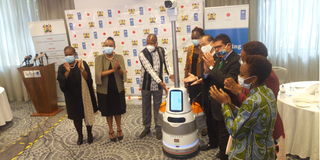Africa CDC lauds Kenya's use of tech to tame Covid-19

Health Cabinet Secretary Mutahi Kagwe receives three robots from UNDP Kenya that will help the government to fight Covid-19 with a Sh240 million funding from the government of Japan in a handover ceremony in Nairobi on January 22, 2021.
Kenya’s adoption of technology to boost its efforts to contain the spread of Covid-19 has been lauded by the African Union (AU), through its health agency, Africa Centres for Disease Control and Prevention (Africa CDC).
The Ministry of Health announced the launch of the online Trusted Travel platform on January 9, becoming the first country on the continent to use the innovation for efficient management of air travels during the Covid-19 pandemic.
“The ministry has collaborated with the AU and Africa CDC, with technical support from PanaBIOS to implement an online system to authenticate and verify laboratory test certificates for travellers,” Health Cabinet Secretary Mutahi Kagwe said.
Africa CDC Director Dr John Nkengasong hailed Kenya’s technology prowess and goodwill, for wasting no time in implementing a solution that he believes fosters confidence on the part of Africans doing business within the continent.
Three robots
He cited Kenya’s recent acquisition of three robots from the United Nation Development Programme (UNDP), which have the capacity to scan between 10 to 100 people per minute from a distance of up to 3.5 metres, as a perfect example of how the country is spearheading the use of emerging technologies in Africa.
“Kenya has always been a trailblazer of innovation in Africa, but it is its commitment to continental integration that makes our collaboration on digital health through Trusted Travel such a powerful showcase of Pan-African innovation,” he noted.
Developed by the PanaBIOS Consortium and Harare-based Tech Company Econet Group, the solution is currently being used at the Jomo Kenyatta International Airport (JKIA) to verify Covid-19 test certificates for travellers and help harmonize entry and exit screening across the continent.
Antonia Filmer, a British business lady who recently used the innovation at JKIA recently, reckons how the digital coordination is speeding up passenger clearance at the airport compared to London.
“On arrival in Nairobi just before entry into the immigration offices, our QR codes were scanned and linked to a temperature screening camera. The stream of passengers arrives and their temperature is displayed on their foreheads on the screen,” she said, adding that it makes it easy to know if you are next with someone with fever.
Travel requirements
The platform provides information on travel requirements at the departure and destination ports and access to a list of government approved laboratories for coronavirus testing in African countries.
It allows travellers to upload their Covid-19 test results online for easy verification by port health and travel officials and helps in the detection of forged certificates.
This, Africa CDS says, will help establish trust and confidence in test results among government authorities, airlines, transport services operators and other stakeholders in the transport sector across the continent.
“As our economies, schools and borders re-open, Africa needs a harmonised approach to reduce the risk of Covid-19 transmission. This is why we launched this portal as an innovative digital tool to help member states harmonize entry and exit requirements to prevent cross-border transmission on the continent,” said Amira Mohammed, commissioner for social affairs, African Union commission.
Without such a system, the proliferation of user-tampered and fake test and vaccine certificates could undermine efforts to minimise cross-border infections while hampering trans-border economic activities.
As Kenya leads in the continent in terms of vulnerability to cyber-attacks, Africa CDC says the portal is secured and safe “and has been developed using international standards of cybersecurity and data protection protocols.”
Other partners involved in providing oversight for implementation of the Trusted Travel Initiative include the World Health Organization, the International Civil Aviation Organization, the United Nations Development Programme, African Civil Aviation Commission, Airport Council International–Africa, African Airlines Association, and the International Air Transport Association.





